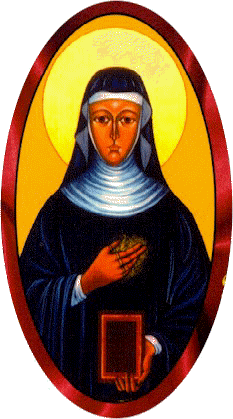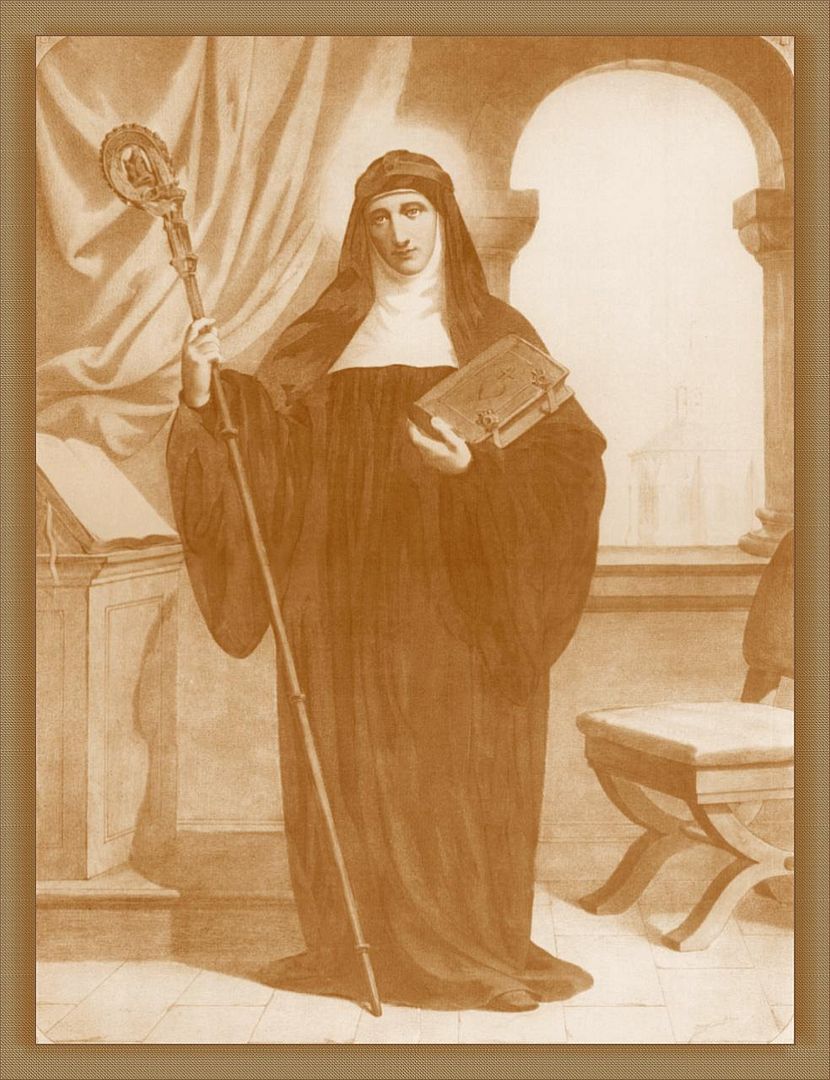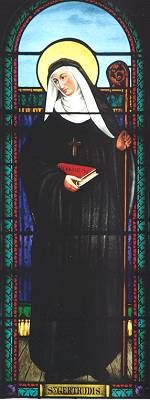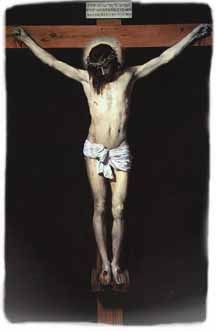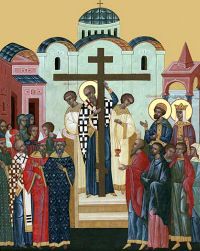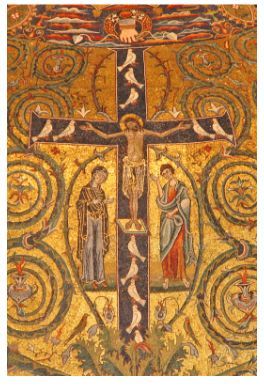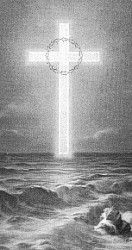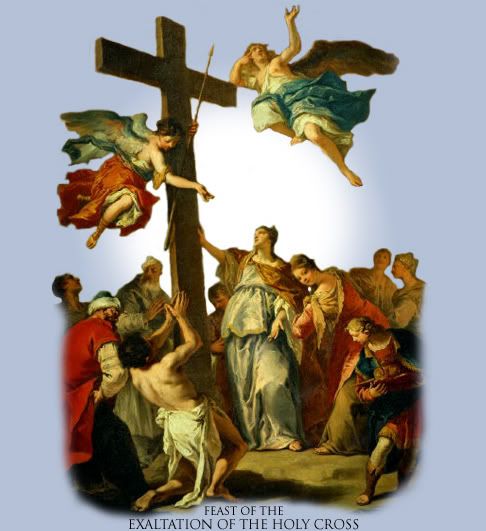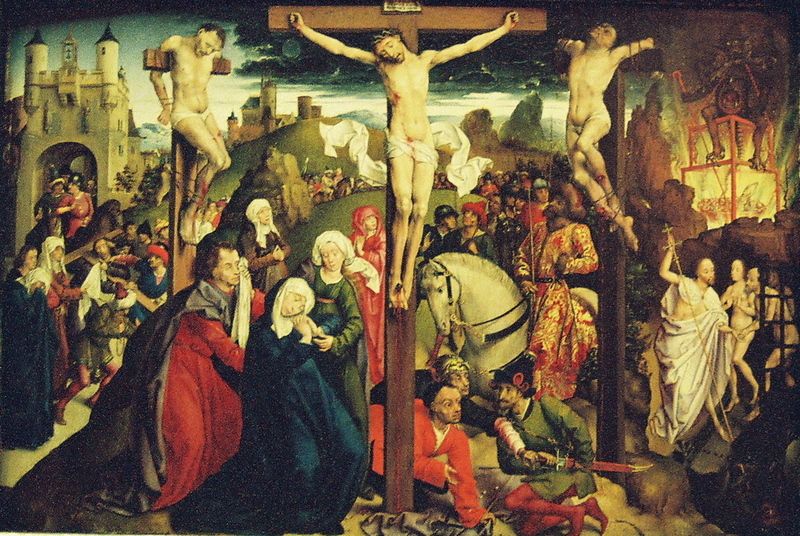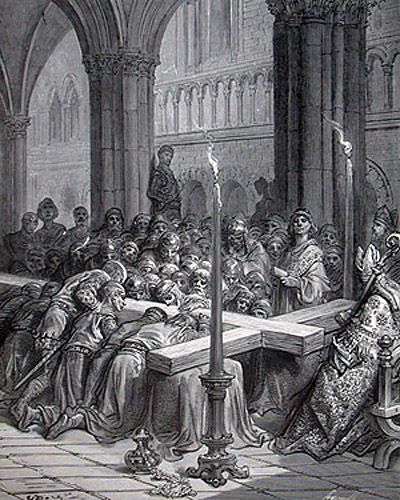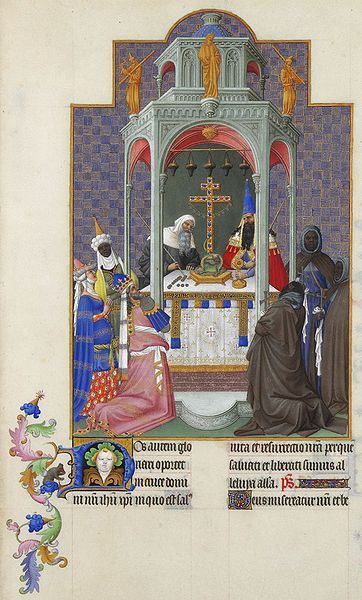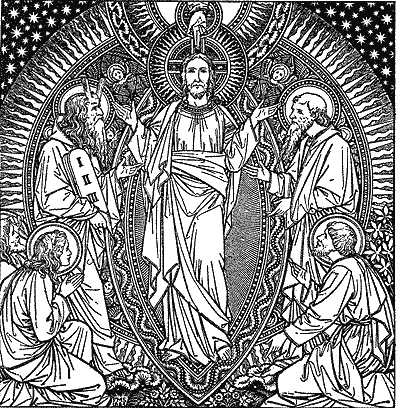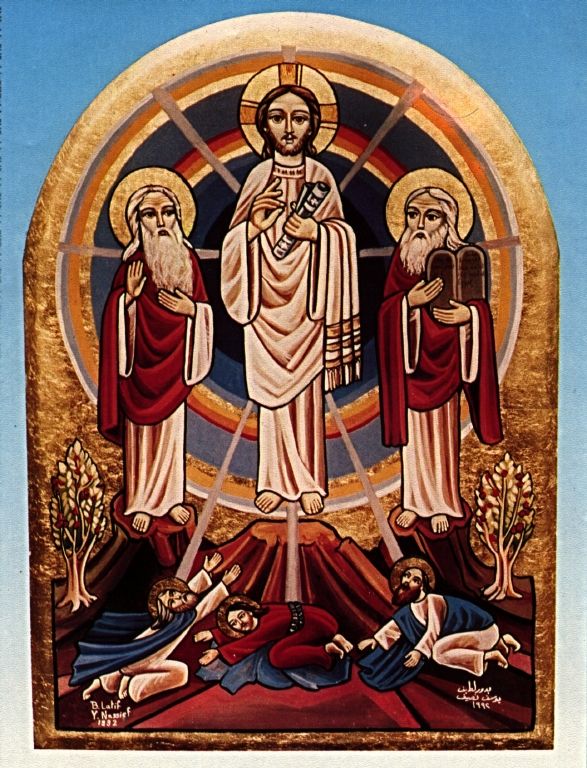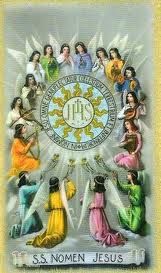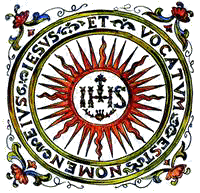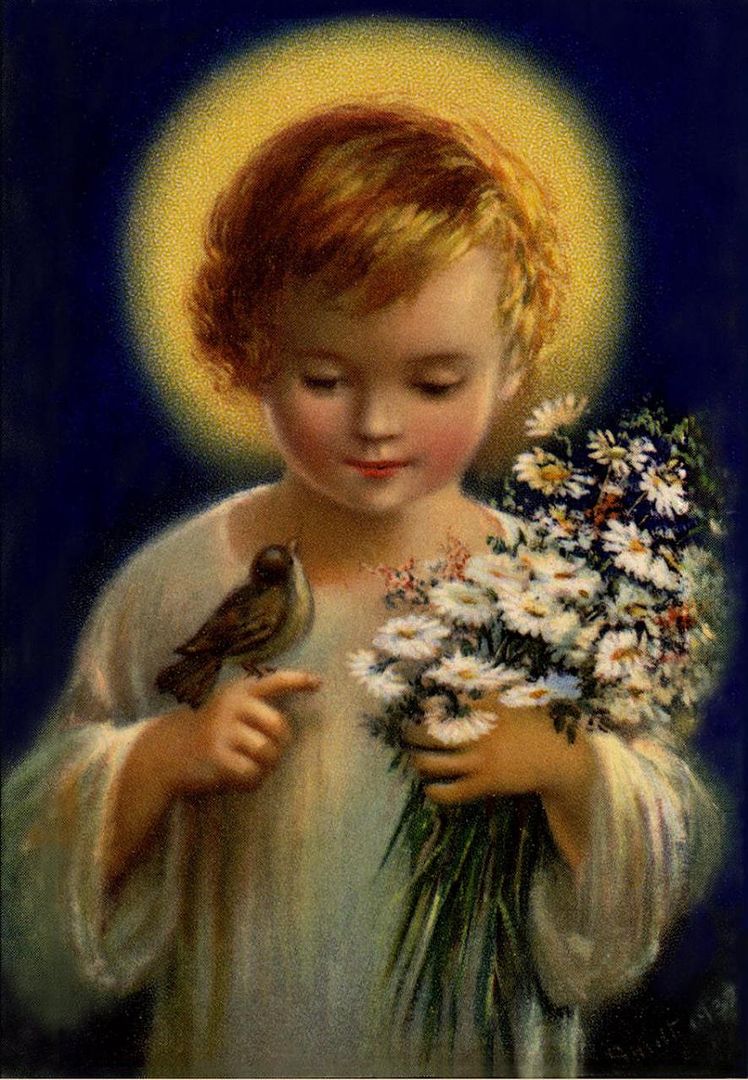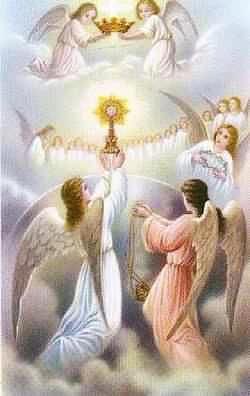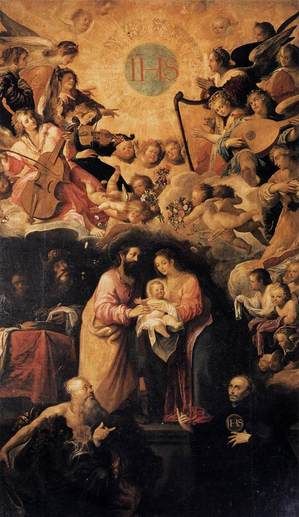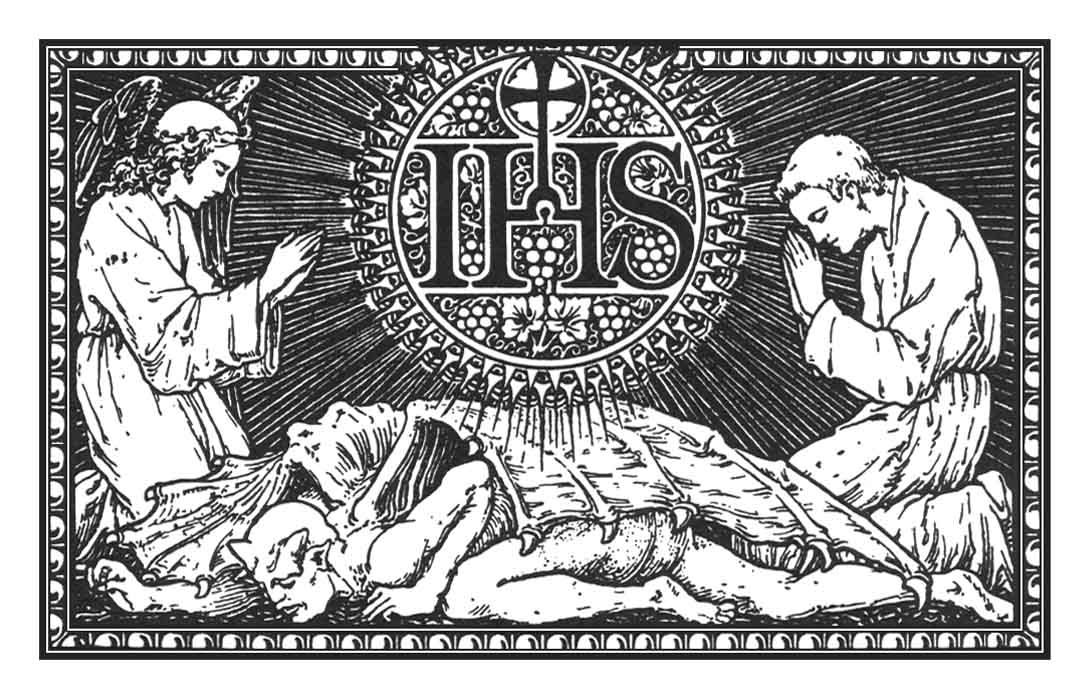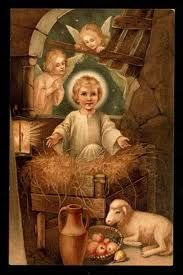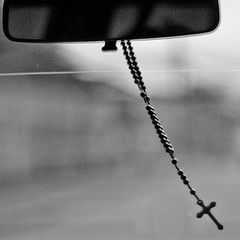"Lord, you have granted me your secret friendship by opening the sacred ark of your divinity, your deified heart, to me in so many ways as to be the source of all my happiness; sometimes imparting it freely, sometimes as a special mark of our mutual friendship. You have so often melted my soul with your loving caresses that, if I did not know the abyss of your overflowing condescensions, I should be amazed were I told that even your Blessed Mother had been chosen to receive such extraordinary marks of tenderness and affection"
Today, November 16, we also celebrate the feast day of Saint Gertrude the Great (also known as Gertrude of Helfta, 1256-1302), mystic, writer, visionary, Virgin of the Church, and Abbess. Saint Gertrude is referred to as "the Great" because of her single-hearted love for the Sacred Heart of Jesus, her numerous writings and exercises for the faithful, and her tireless compassion and prayer for the souls in purgatory.
Little is known about the early life of Gertrude, other than that she was born in Eisleben in Saxony. Her parents were either deceased or incapacitated, and by the age of five, Gertrude had been placed in the care of a cloister of Benedictine nuns in Rodalsdorf. When she completed her studies, she was moved to the monastery at Helfta (although it isn’t clear why). The sisters of the Helfta monastery kept records, describing the child, Gertrude, as loveable, quick-witted, and gracious. She progressed through her studies with ease, demonstrating clarity of thought and depth of understanding far beyond her years. While she excelled at all subjects—including grammar, rhetoric, logic, and Latin—Gertrude was most adept at theology and divinity studies. She also studied and excelled at music.
When she reached the age of admission, sometime around 16, Gertrude took the veil at Helfta monastery, entering the community there, and committing herself completely in service to the Lord. As a novice, she continued her studies in liturgy, scripture, and spiritual writing. A voracious reader, she became fluent in Latin and German. However, as much as she excelled at her studies, her sisters believed her to be neglecting her spiritual calling. And by her own admission, by the age of 24, Gertrude had grown tired of the monastic routine, and fallen into a deep depression.
However, that would soon change. Just after she reached her 25th year, Gertrude was confronted by a mystical encounter with Christ—an event she referred to as her “conversion.” In her experience, she heard Christ (deep within her heart) say: "Do not fear. I will save you and set you free." She wrote: "in a happy hour, at the beginning of twilight, thou O God of truth, more radiant than any light, yet deeper than any secret thing, determined to dissolve the obscurity of my darkness." What followed was a series of mystical visions and ecstasies, which drew her into contemplative, mystical prayer, transformed her life, increased her devotion to the Sacred Heart of Jesus, and led her to pen her exercises. Gertrude gave up her literary studies completely, spending all of her time in prayer, study of Scripture, and contemplation.
Saint Gertrude prayed that she, and her sisters, might have more time to pray and fewer distractions and requirements. During one encounter, Jesus answered "It does not matter to me whether you perform spiritual exercises or manual labor, provided only that your will is directed to me with a right intention. If I took pleasure only in your spiritual exercises, I should certainly have reformed human nature after Adam's fall so that it would not need food, clothing or the other things that man must find or make with such effort."
Saint Gertrude was especially devoted to the Sacred Heart of Jesus, as well to the suffering of the souls in Purgatory. In one Vision, Our Lord told Gertrude that He longs for someone to ask Him to release souls from purgatory, just as a king who imprisons a friend for justice's sake hopes that someone will beg for mercy for his friend. In her text, Gertrude recorded the Lord’s words: "I accept with highest pleasure what is offered to Me for the poor souls, for I long inexpressibly to have near Me those for whom I paid so great a price. By the prayers of thy loving soul, I am induced to free a prisoner from purgatory as often as thou dost move thy tongue to utter a word of prayer."
At another time, Gertrude was given the following Prayer, which Our Lord told her would release 1000 Souls from Purgatory every time it is said with love and devotion. "Eternal Father, I offer You the Most Precious Blood of Thy Divine Son, Jesus Christ, in union with the Masses said throughout the world today, for all the Holy Souls in Purgatory, for sinners everywhere, those in the Universal Church, in my home, and in my family." From that moment, Gertrude prayed incessantly for the souls of Purgatory.
Gertrude’s mystical encounters with the Lord continued, and when she turned 33, Jesus asked her to record in writing an account of her experiences. Out of humility, she resisted, but eventually acquiesced so that her experiences might encourage others. Gertrude penned a short biography, entitled “The Herald of God’s Loving-Kindness,” to which her sisters added all the information they knew about her. In her text, Gertrude carefully described her own “conversion” and awakening to Christ, and her complete unconditional surrender to the grace and beauty of the Lord.
Gertrude later wrote another text, her “Spiritual Exercises,” to inspire and encourage her sisters with prayers, hymns, and reflections. Saint Gertrude’s exercises remain important, grounded in themes and rites of Church liturgy for occasions of Baptism, conversion, commitment, discipleship, union with God, praise of God, and preparation for death. They continue to be practiced by those who are interested in deepening their spirituality through prayer and meditation.
Saint Gertrude’s visions continued until the end of her life. When it was her time, the Lord called her to Him, saying: "Come, my chosen one, and I will place in you My throne." Her relics remain at the Abbey in Helfta, where they are venerated today. Though she was never formally canonized, Pope Clement XII in 1677 directed that her feast be observed throughout the Church.
Saint Gertrude's understanding of God's love continues to inspire us today. For her, the love of the Lord is anchored in the mystery of the mutual love between the Persons of the Blessed Trinity, which is forever directed toward all creation. But for Gertrude, the focus on the mystery of Jesus was less about history and more about the humanity He shares with us. Her emphasis was not that we should imitate Jesus, but that we are invited to participate in a human-divine union that already exists, based upon His creation. In prayer and sacrament, we encounter this blessed union. Gertrude lived this love every day, throughout her activities and the Liturgy, where she found Christ. Her life is a reminder to each of us that the heart of the Christian life is prayer, through which we unite with Our Lord in a deeply personal way.
From the Revelations by Saint Gertrude:
“May my soul bless you, O Lord God my Creator, may my soul bless you. From the very core of my being may all your merciful gifts sing your praise. Your generous care for your daughter has been rich in mercy; indeed it has been immeasurable, and as far as I am able I give you thanks. I praise and glorify your great patience which bore with me even though, from my infancy and childhood, adolescence and early womanhood, until I was nearly 26, I was always so blindly irresponsible. Looking back I see that but for your protecting hand I would haven been quite without conscience in thought, word or deed. But you came to my aid by giving me a natural dislike of evil and a natural delight in what is good, and provided me with necessary correction from those among whom I lived. To make amends for the way I previously lived, I offer you, most loving Father, all the sufferings of your beloved Son, from that first infant cry as he lay on the hay in the manger, until that final movement when, bowing his head, with a mighty voice, Christ gave up his spirit. I think, as I make this offering, of all that he underwent, his needs as a baby, his dependence as a young child, the hardships of youth and the trials of early manhood. To atone for all my neglect I offer, most loving Father, all that your only-begotten Son did during his life, whether in thought, word or deed. And now, as an act of thanksgiving, I praise and worship you, Father, in deepest humility for you most loving kindness and mercy. Though I was hurrying to my eternal loss, your thoughts of me were thoughts of peace and not of affliction, and you lifted me up with so many great favors. Finally, you drew me to yourself by your faithful promises of the good things you would give me from the hour of my death. So great are these promises that for their sake alone, even if you had given me nothing besides, my heart would sigh for you always and be filled with a lively hope.”
The Prayer of Saint Gertrude for the Souls in Purgatory
Eternal Father, I offer Thee the most Precious Blood of Thy Divine Son, Jesus Christ, in union with the Masses said throughout the world today, for all the Holy Souls in Purgatory, for sinners everywhere, for sinners in the Universal Church, for those in my own home and within my family. Amen.
Prayer to the Sacred Heart of Jesus
O Sacred Heart of Jesus, fountain of eternal life, Your Heart is a glowing furnace of Love. You are my refuge and my sanctuary. O my adorable and loving Savior, consume my heart with the burning fire with which Yours is aflamed. Pour down on my soul those graces which flow from Your love. Let my heart be united with Yours. Let my will be conformed to Yours in all things. May Your Will be the rule of all my desires and actions. Amen.
Father,
you filled the heart of St. Gertrude
with the presence of your love.
Bring light into our darkness
and let us experience the joy of your presence
and the power of your grace.
Grant this through our Lord Jesus Christ, your Son, who
lives and reigns with you and the Holy Spirit, one God, for ever and ever. Amen.
Year 2: Day 320 of 365
Prayer Intentions: Deep Union with the Lord; Improved Prayer Lives
Requested Intentions: Blessings on overseas employment (M); Healing of mother (L); Successful employment for husband (G); Successful employment, personal fulfillment (C); Health and recovery of ill sister (A); Resolution of legal issues; Grace and protection (E); Successful and meaningful employment (S); Restoration of a marriage (A); Peace and tolerance in a family, support for those with Parkinson’s Disease (M); For the restoration of a daughter’s marriage, end to debt (S); Employment and continued strength (K); Successful examinations for a son (J); Employment and blessings of a child (S); Employment and financial security (F); Successful work placement, continued health (A); Grace and healing for a family (P); Healing of a father (M); Academic success for son, employment for husband and brother (B); Freedom from anxiety and panic attacks (R); Health and healing in preparation for surgery (C); Healing of a chronic illness (P); Safety of a family during storms (A); Successful home ownership (P); Healing of a marriage (M); Employment for a husband, blessings for a marriage (E); Successful examinations for a daughter, healing of a relationships (V).
Why pray the Rosary every day for a year?
Each time the Blessed Virgin has appeared-- whether it be to Saint Bernadette Soubirous at Lourdes; to Lucia, Jacinta, and Francisco at Fatima; or to Mariette Beco at Banneux-- she has asserted the importance, saving grace, and power of praying the Holy Rosary on a daily basis. Based upon her words, the Rosary is penance and conversion for sinners, a pathway to peace, an end to war, and a powerful act of faith in Jesus Christ. Pope Paul VI presented the Rosary as a powerful means to reach Christ "not merely with Mary but indeed, insofar as this is possible to us, in the same way as Mary, who is certainly the one who thought about Him more than anyone else has ever done."
To show us how this is done, perhaps no one has been more eloquent than the great Cardinal Newman, who wrote: "The great power of the Rosary consists in the fact that it translates the Creed into Prayer. Of course, the Creed is already in a certain sense a prayer and a great act of homage towards God, but the Rosary brings us to meditate again on the great truth of His life and death, and brings this truth close to our hearts. Even Christians, although they know God, usually fear rather than love Him. The strength of the Rosary lies in the particular manner in which it considers these mysteries, since all our thinking about Christ is intertwined with the thought of His Mother, in the relations between Mother and Son; the Holy Family is presented to us, the home in which God lived His infinite love."
As Mary said at Fatima, "Jesus wants to use you to make Me known and loved. He wishes to establish the devotion to My Immaculate Heart throughout the world. I promise salvation to whoever embraces it; these souls will be dear to God, like flowers put by Me to adorn his throne."

comments (0)
|
Labels:
Conversion,
Feast Day,
Holy Name of Jesus,
Sacred Heart of Jesus,
Saints,
Visions
Adoramus te, christe, et benedicimus tibi,
quia per crucem tuam redemisti mundum.
We adore thee, O Christ, and we bless thee,
for by thy cross thou hast redeemed the world.
Today, September 14, we celebrate the feast of the Exaltation of the Holy Cross, the sign of our Christianity, the source of our redemption, a vivid reminder of the sacrifice our Lord and Savior made for us upon Calvary. It is the sign of our freedom, the Sign of the Cross, with which we mark ourselves. At Baptism, we are sealed with the Sign of the Cross, signifying the fullness of redemption and that we belong to Christ. Throughout our lives, especially in times of trial and struggle, we look to the Sign of the Cross as our strength and protection. We make the Sign of the Cross before prayer fixing our minds and hearts to God. We make the Sign of the Cross at the conclusion of prayer to keep close to God. Rather than just a movement of our hands, let us remember today that our Sign of the Cross is a consecration to the Lord—a movement in which we give our entire self to God — mind, soul, heart, body, will, and thoughts, joyfully exclaiming:
“O cross, you are the glorious sign of victory.
Through your power may we share in the triumph of Christ Jesus.”
Today’s feast is a triumphant liturgy— a day in which red is worn to symbolize the glorious and saving sacrifice of Jesus on the Cross. The Church sings of the triumph of the Cross—no longer an instrument of death and torture—but the powerful and glorious instrument of our redemption. To follow Christ we must take up His cross, follow Him and become obedient until death, even if it means death on the cross. We identify with Christ on the Cross and become co-redeemers, sharing in His cross.
The cross has long been the symbol of Christians. As early as 148, Saint Justin Martyr spoke of the cross as the “standard symbol” of Christianity. By 211, Tertullian had taught his students that Christians should rarely do “anything of substance without first making the Sign of the Cross.” Tradition holds that this sign of our faith identifies our actions, and reminds us of Whom we belong to.
The history of the Feast of the Exaltation of the Holy Cross was established in the seventh century, but has it’s origins in the fourth century. As previously written, Saint Helena of Constantinople (mother of Roman Emperor Constantine I), is said to have discovered the True Cross upon which hung the Savior of the World in 326. She commissioned the building of the Church of the Holy Sepulchre, which was built on the site of discovery and dedicated on September 14, 335. The most substantial piece of the True Cross was placed inside of the church. During the dedication, the practice of veneration of the cross was begun.
However, in the year 627, during the reign of the emperor Heraclius I of Constantinople, the Persians conquered the city of Jerusalem and removed the True Cross. The emperor resolved to win back by combat this precious object. Before he left Constantinople with his army, Heraclius went to the church and begged God to sustain his courage, taking with him to combat an image of Jesus. His armies miraculously won victory after victory, and peace was soon established. Heraclius insisted that one of the conditions of the peace treaty was the return of the True Cross, and upon return to Jerusalem, the faithful honored the occasion with procession, olive branches, and torches.
Carrying the cross on his shoulders, wishing to honor the Lord, processed through the city, returning the saving instrument of grace to Calvary. However, upon reaching the gates, he found he could go no further. “Take care, O Emperor!” the Patriarch Zachary is reported to have said to him. “Certainly the imperial clothing you are wearing does not sufficiently resemble the poor and humiliated condition of Jesus carrying His cross.”
Heraclius was touched on hearing this, and removed his splendid jewel-covered robes and shoes. Donning a poor man’s tunic, he continued to Calvary and replaced the True Cross in the sanctuary of the church. During the course of the procession, numerous miracles occurred, and the people greatly rejoiced. From that year on, the Feast of the Exaltation of the Holy Cross was instituted.
Saint Symeon the New Theologian said of the cross:
“... For Christians the cross is magnification, glory, and power: for all our power is in the power of Christ who was crucified; all our sinfulness is mortified by the death of Christ on the cross; and all our exaltation and all our glory are in the humility of God, who humbled himself to such an extent that he was pleased to die even between evil-doers and thieves. For this very reason Christians who believe in Christ sign themselves with the sign of the cross not simply, not just as it happens, not carelessly, but with all heedfulness, with fear and with trembling, and with extreme reverence. For the image of the cross shows the reconciliation and friendship into which man has entered with God.
Therefore the demons also fear the image of the cross, and they do not endure to see the sign of the cross depicted even in the air, but they flee from this immediately knowing that the cross is the sign of the friendship of men with God...
Those who have understood this mystery and in very fact have known in experience the authority and power which the cross has over demons, have likewise understood that the cross gives the soul strength, power, meaning, and divine wisdom... To the degree of the reverence which one has toward the cross, he receives corresponding power and help from God. To him may there be glory and dominion for ever. Amen.”
We are reminded today, as we celebrate the cross, of God’s love for humanity. The Gospel reminds us of the astounding reality that ours is a God who truly loves His people. God loves us so much that He sent His beloved Son to redeem us and to bring us the good news of salvation. Out of obedience to the will of the Father, Jesus proclaimed the Gospel of love to all even unto death. We recall the words of Jesus: “He who does not take up his cross and follow Me is not worthy of Me. He who finds his life will lose it, and he who loses his life for My sake shall find it” (Mt 10:38,39). If we take up our own crosses, we unite ourselves more closely to Christ who offered His very self for our salvation. May we who take up our crosses likewise be exalted one day in the glory of eternal life with God.
"How splendid the cross of Christ! It brings life, not death; light, not darkness; Paradise, not its loss. It is the wood on which the Lord, like a great warrior, was wounded in hands and feet and side, but healed thereby our wounds. A tree has destroyed us, a tree now brought us life." (Saint Theodore of Studios).
God our Father,
in obedience to you your only Son accepted death on the Cross for the salvation of mankind.
We acknowledge the mystery of the Cross on earth. May we receive the gift of redemption in heaven.
We ask this through our Lord Jesus Christ, your Son, who lives and reigns with you and the Holy Spirit, one God, for ever and ever.
From the Homily of Pope John Paul II (September 14, 2003):
"O Crux, ave spes unica! Hail, O Cross, our only hope!
Dear Brothers and Sisters, we are invited to look upon the Cross. It is the “privileged place” where the love of God is revealed and shown to us.… On the Cross human misery and divine mercy meet. The adoration of this unlimited mercy is for man the only way to open himself to the mystery which the Cross reveals.
The Cross is planted in the earth and would seem to extend its roots in human malice, but it reaches up, pointing as it were to the heavens, pointing to the goodness of God. By means of the Cross of Christ, the Evil One has been defeated, death is overcome, life is given to us, hope is restored, light is imparted. O Crux, ave spes unica! …
“As Moses lifted up the serpent in the wilderness, so must the Son of man be lifted up, that whoever believes in Him may have eternal life” (John 3:14-15), says Jesus. What do we see then when we bring our eyes to bear on the cross where Jesus was nailed (cf. John 19:37)? We contemplate the sign of God’s infinite love for humanity.
O Crux, ave spes unica! Saint Paul speaks of the same theme in the letter to the Ephesians…. Not only did Christ Jesus become man, in everything similar to human beings, but He took on the condition of a servant and humbled Himself even more by becoming obedient to the point of death, even death on a cross (cf. Philippians 2:6-8).
Yes, “God so loved the world that He gave His only Son” (John 3:16). We admire — overwhelmed and gratified — the breadth and length and height and depth of the love of Christ which surpasses all knowledge (cf. Ephesians 3:18-19)! O Crux, ave spes unica!
Through the mystery of your Cross and your Resurrection, save us O Lord! Amen.”
Year 2: Day 256 of 365
Prayer Intentions: Lives consecrated to Our Lord; Recognition of His sacrifice; Willingness to make our own sacrifices
quia per crucem tuam redemisti mundum.
We adore thee, O Christ, and we bless thee,
for by thy cross thou hast redeemed the world.
Today, September 14, we celebrate the feast of the Exaltation of the Holy Cross, the sign of our Christianity, the source of our redemption, a vivid reminder of the sacrifice our Lord and Savior made for us upon Calvary. It is the sign of our freedom, the Sign of the Cross, with which we mark ourselves. At Baptism, we are sealed with the Sign of the Cross, signifying the fullness of redemption and that we belong to Christ. Throughout our lives, especially in times of trial and struggle, we look to the Sign of the Cross as our strength and protection. We make the Sign of the Cross before prayer fixing our minds and hearts to God. We make the Sign of the Cross at the conclusion of prayer to keep close to God. Rather than just a movement of our hands, let us remember today that our Sign of the Cross is a consecration to the Lord—a movement in which we give our entire self to God — mind, soul, heart, body, will, and thoughts, joyfully exclaiming:
“O cross, you are the glorious sign of victory.
Through your power may we share in the triumph of Christ Jesus.”
Today’s feast is a triumphant liturgy— a day in which red is worn to symbolize the glorious and saving sacrifice of Jesus on the Cross. The Church sings of the triumph of the Cross—no longer an instrument of death and torture—but the powerful and glorious instrument of our redemption. To follow Christ we must take up His cross, follow Him and become obedient until death, even if it means death on the cross. We identify with Christ on the Cross and become co-redeemers, sharing in His cross.
The cross has long been the symbol of Christians. As early as 148, Saint Justin Martyr spoke of the cross as the “standard symbol” of Christianity. By 211, Tertullian had taught his students that Christians should rarely do “anything of substance without first making the Sign of the Cross.” Tradition holds that this sign of our faith identifies our actions, and reminds us of Whom we belong to.
The history of the Feast of the Exaltation of the Holy Cross was established in the seventh century, but has it’s origins in the fourth century. As previously written, Saint Helena of Constantinople (mother of Roman Emperor Constantine I), is said to have discovered the True Cross upon which hung the Savior of the World in 326. She commissioned the building of the Church of the Holy Sepulchre, which was built on the site of discovery and dedicated on September 14, 335. The most substantial piece of the True Cross was placed inside of the church. During the dedication, the practice of veneration of the cross was begun.
However, in the year 627, during the reign of the emperor Heraclius I of Constantinople, the Persians conquered the city of Jerusalem and removed the True Cross. The emperor resolved to win back by combat this precious object. Before he left Constantinople with his army, Heraclius went to the church and begged God to sustain his courage, taking with him to combat an image of Jesus. His armies miraculously won victory after victory, and peace was soon established. Heraclius insisted that one of the conditions of the peace treaty was the return of the True Cross, and upon return to Jerusalem, the faithful honored the occasion with procession, olive branches, and torches.
Carrying the cross on his shoulders, wishing to honor the Lord, processed through the city, returning the saving instrument of grace to Calvary. However, upon reaching the gates, he found he could go no further. “Take care, O Emperor!” the Patriarch Zachary is reported to have said to him. “Certainly the imperial clothing you are wearing does not sufficiently resemble the poor and humiliated condition of Jesus carrying His cross.”
Heraclius was touched on hearing this, and removed his splendid jewel-covered robes and shoes. Donning a poor man’s tunic, he continued to Calvary and replaced the True Cross in the sanctuary of the church. During the course of the procession, numerous miracles occurred, and the people greatly rejoiced. From that year on, the Feast of the Exaltation of the Holy Cross was instituted.
Saint Symeon the New Theologian said of the cross:
“... For Christians the cross is magnification, glory, and power: for all our power is in the power of Christ who was crucified; all our sinfulness is mortified by the death of Christ on the cross; and all our exaltation and all our glory are in the humility of God, who humbled himself to such an extent that he was pleased to die even between evil-doers and thieves. For this very reason Christians who believe in Christ sign themselves with the sign of the cross not simply, not just as it happens, not carelessly, but with all heedfulness, with fear and with trembling, and with extreme reverence. For the image of the cross shows the reconciliation and friendship into which man has entered with God.
Therefore the demons also fear the image of the cross, and they do not endure to see the sign of the cross depicted even in the air, but they flee from this immediately knowing that the cross is the sign of the friendship of men with God...
Those who have understood this mystery and in very fact have known in experience the authority and power which the cross has over demons, have likewise understood that the cross gives the soul strength, power, meaning, and divine wisdom... To the degree of the reverence which one has toward the cross, he receives corresponding power and help from God. To him may there be glory and dominion for ever. Amen.”
We are reminded today, as we celebrate the cross, of God’s love for humanity. The Gospel reminds us of the astounding reality that ours is a God who truly loves His people. God loves us so much that He sent His beloved Son to redeem us and to bring us the good news of salvation. Out of obedience to the will of the Father, Jesus proclaimed the Gospel of love to all even unto death. We recall the words of Jesus: “He who does not take up his cross and follow Me is not worthy of Me. He who finds his life will lose it, and he who loses his life for My sake shall find it” (Mt 10:38,39). If we take up our own crosses, we unite ourselves more closely to Christ who offered His very self for our salvation. May we who take up our crosses likewise be exalted one day in the glory of eternal life with God.
"How splendid the cross of Christ! It brings life, not death; light, not darkness; Paradise, not its loss. It is the wood on which the Lord, like a great warrior, was wounded in hands and feet and side, but healed thereby our wounds. A tree has destroyed us, a tree now brought us life." (Saint Theodore of Studios).
God our Father,
in obedience to you your only Son accepted death on the Cross for the salvation of mankind.
We acknowledge the mystery of the Cross on earth. May we receive the gift of redemption in heaven.
We ask this through our Lord Jesus Christ, your Son, who lives and reigns with you and the Holy Spirit, one God, for ever and ever.
From the Homily of Pope John Paul II (September 14, 2003):
"O Crux, ave spes unica! Hail, O Cross, our only hope!
Dear Brothers and Sisters, we are invited to look upon the Cross. It is the “privileged place” where the love of God is revealed and shown to us.… On the Cross human misery and divine mercy meet. The adoration of this unlimited mercy is for man the only way to open himself to the mystery which the Cross reveals.
The Cross is planted in the earth and would seem to extend its roots in human malice, but it reaches up, pointing as it were to the heavens, pointing to the goodness of God. By means of the Cross of Christ, the Evil One has been defeated, death is overcome, life is given to us, hope is restored, light is imparted. O Crux, ave spes unica! …
“As Moses lifted up the serpent in the wilderness, so must the Son of man be lifted up, that whoever believes in Him may have eternal life” (John 3:14-15), says Jesus. What do we see then when we bring our eyes to bear on the cross where Jesus was nailed (cf. John 19:37)? We contemplate the sign of God’s infinite love for humanity.
O Crux, ave spes unica! Saint Paul speaks of the same theme in the letter to the Ephesians…. Not only did Christ Jesus become man, in everything similar to human beings, but He took on the condition of a servant and humbled Himself even more by becoming obedient to the point of death, even death on a cross (cf. Philippians 2:6-8).
Yes, “God so loved the world that He gave His only Son” (John 3:16). We admire — overwhelmed and gratified — the breadth and length and height and depth of the love of Christ which surpasses all knowledge (cf. Ephesians 3:18-19)! O Crux, ave spes unica!
Through the mystery of your Cross and your Resurrection, save us O Lord! Amen.”
Year 2: Day 256 of 365
Prayer Intentions: Lives consecrated to Our Lord; Recognition of His sacrifice; Willingness to make our own sacrifices
Requested Intentions: Clear speech for a child (C); Conversion of a family (A); Successful employment (S); For the healing of impaired vision (F); For a couple experiencing difficulties (L); Successful employment after finishing college (M); Mother’s health (A); Financial security, freedom from anxiety (S); For a son and cousins (L); Peace and civility (B); Successful examination results (D); Safety of family, strength, courage, wisdom (C); For the souls of a departed father and brother, finding of a suitable marriage partner (R); Successful pilgrimage, deepening of prayer life (R); Restoration of health (J); Restoration of health (S); Freedom from pride (A); For children and marriage (M); For the birth of a healthy baby (Y); For personal family intentions, for the sick, poor, hungry, and homeless (G); Financial security and peace (J); Grace, peace, and obedience to the will of God in a marriage (H); Successful and blessed marriage for sin, freedom from anxiety for husband, spiritual contentedness for family (N); Employment and health for a husband (B); Recovery and health of a mother (J); For a family to grow closer to the Church, salvation for all children (D); Successful employment (L); Successful employment (S); Renewal of faith life (A); Support for an intended marriage, health for friend and aunt (J); Mental health assistance for son (G); Freedom from illness (S); Successful employment (C).
28About eight days after Jesus said this, he took Peter, John and James with him and went up onto a mountain to pray. 29As he was praying, the appearance of his face changed, and his clothes became as bright as a flash of lightning. 30Two men, Moses and Elijah, 31appeared in glorious splendor, talking with Jesus. They spoke about his departure, which he was about to bring to fulfillment at Jerusalem. 32Peter and his companions were very sleepy, but when they became fully awake, they saw his glory and the two men standing with him. 33As the men were leaving Jesus, Peter said to him, "Master, it is good for us to be here. Let us put up three shelters—one for you, one for Moses and one for Elijah." (He did not know what he was saying.)
34While he was speaking, a cloud appeared and enveloped them, and they were afraid as they entered the cloud. 35A voice came from the cloud, saying, "This is my Son, whom I have chosen; listen to him." 36When the voice had spoken, they found that Jesus was alone. The disciples kept this to themselves, and told no one at that time what they had seen. (Luke 9:28-36)
Today, August 6, we celebrate the feast of the Transfiguration of Our Lord, what Pope Saint Leo the Great called, “Law through Moses, Grace and Truth through Jesus Christ.” The Transfiguration is the fourth Luminous Mystery, or Mystery of Light (See also the Miracle at the Wedding in Cana, The Baptism of Jesus, the Proclamation of the Kingdom of God, and the Institution of the Holy Eucharist). Explaining the Transfiguration, Pope John Paul II wrote, "The mystery of light par excellence is the Transfiguration, traditionally believed to have taken place on Mount Tabor. The glory of the Godhead shines forth from the face of Christ as the Father commands the astonished Apostles to 'listen to him' (cf. Luke 9:35 and parallels) and to prepare to experience with him the agony of the Passion, so as to come with him to the joy of the Resurrection and a life transfigured by the Holy Spirit.”
According to the Catechism of the Catholic Church, during the Transfiguration, “For a moment, Jesus discloses His divine glory, confirming Peter's confession. He also reveals that He will have to go by the way of the cross at Jerusalem in order to 'enter into His glory'. (Luke 24:26)" As Luke recounts, God the Father commanded, "Listen to him." The disciple John, called the beloved disciple for his faithfulness to Jesus, was the only disciple who did not abandon Jesus on His way to the Cross at Calvary. As we consider this fact, it is interesting to not that he was only able to accomplish this faithfulness while holding the arm of Mary, the Mother of God. In thinking of John, we realize that we can suffer tremendous pain in this life with bravery, by embracing our Holy Mother and praying her Rosary.
St. Cyril of Alexandria wrote of the Transfiguration in terms of the connection between suffering and glory, between the Law and the Prophets, between the foreshadowing of the Old Testament and the prophesies fulfilled in the Jesus. He wrote in 444: "I say to you, there are some of those standing here who shall not taste of death until they have seen the kingdom of God." ... By the "kingdom of God" He means the sight of the glory in which He will appear at His revelation to the inhabitants of earth. He will come in the glory of God the Father and not in a humble condition like ours. How did He make those who received the promise spectators of a thing so wonderful? He goes up into the mountain taking three chosen disciples with Him. He is transformed to such a surpassing and godlike brightness that His garments even glittered with rays of fire and seemed to flash like lightning. Besides, Moses and Elijah stood at Jesus’ side and spoke with one another about His departure that He was about, it says, to accomplish at Jerusalem. This meant the mystery of the dispensation in the flesh and of His precious suffering upon the Cross. It is also true that the law of Moses and the word of the holy prophets foreshadowed the mystery of Christ. The law of Moses foreshadowed it by types and shadows, painting it as in a picture. The holy prophets in different ways declared beforehand that in due time He would appear in our likeness and for the salvation and life of us all, agree to suffer death on the tree. Moses and Elijah standing before Him and talking with one another was a sort of representation. It excellently displayed our Lord Jesus Christ as having the law and the prophets for His bodyguard. It displayed Christ as being the Lord of the Law and the Prophets, as foretold in them by those things that they proclaimed in mutual agreement beforehand. The words of the prophets are not different from the teachings of the law.”
For Jesus, we can only imagine what He prayed about on the mountain prior to the Transfiguration. Given the pain and Passion that lied in store for Him, we can guess that He was contemplating His earthly sacrifice and death. The Transfiguration was a message from above, preparing the disciples for the pain and suffering that was growing near. As Jesus descends from the mountain, He sets His sights firmly and resolutely on Jerusalem, on His death, on our redemption.
The Transfiguration makes us stop and think for a moment. Jesus revealed His sanctity to the disciples present, and then walked graciously to His death for us. But what of our own transfiguration? How has the sacrifice of Jesus changed us? We only need look to the Eucharist for our answer. For us, we are able to experience moments of profound Transfiguration in the Eucharist, when we receive Holy Communion. This experience of the Eucharist is more than a symbol, it is the physical manifestation of the Body, Blood, Soul and Divinity of Christ. It is for us, according to Saint Thomas Aquinas, “a pledge of future glory, containing in Itself all delight.” The celebration of the Eucharist is our transfiguration on earth to allowing us to endure the agony of our daily passion in preparation for the glorious joy of our Resurrection!
Dear Jesus,
Thou didst appear to Thy three disciples in all Thy glory.
I know that Thou art now in Heaven seated at the right hand of the Father in the same glorious state Thou revealed Thyself in on Mount Tabor.
I am truly thankful that Thou hast suffered, died and risen so as to conquer death so that I may be saved from the it's power.
I know that I will one day be risen with a glorified body when Thou come to judge the living and the dead.
I am sorry for the many times that I have offended Thee by not striving for holiness and by being lazy in my prayer life.
Please send me the graces I need to truly desire holiness and to make the sacrifices necessary to achieve it so that I may live my life always mindful that one day I will stand before Thee and be held accountable for all my action and lack thereof.
Amen.
Today, January 3, we celebrate the feast of the Most Holy Name of Jesus—a name given to Jesus directly by God, through His holy and angelic messengers. As Saint Paul wrote to the Philippians: "That in the name of Jesus every knee should bow, of those that are in heaven, on earth, and under the earth" (Philippians 2:10). As we contemplate the blessed name of Our Lord and Savior, we realize that it is not simply a name, but His name, and the name above all other names. The Holy Name of Jesus does not simply identify our Lord, it captures and summarizes His purpose and perpetual existence: as Redeemer of Mankind.
Today, we pray in a special way, to Our Lord and Savior, that through the power of His Name, and His unending and overflowing love for us, we may be saved.
Litany of the Most Holy Name of Jesus
Lord, have mercy.
Lord, have mercy.
Christ, have mercy.
Christ, have mercy.
Lord, have mercy.
Lord, have mercy.
Jesus, hear us.
Jesus, graciously hear us.
God, the Father of Heaven, have mercy on us.
God the Son, Redeemer of the world, have mercy on us.
God, the Holy Spirit, have mercy on us.
Holy Trinity, one God, have mercy on us.
Jesus, Son of the living God, have mercy on us.
Jesus, Splendor of the Father, have mercy on us.
Jesus, Brightness of eternal Light, have mercy on us.
Jesus, King of Glory, have mercy on us.
Jesus, Sun of Justice, have mercy on us.
Jesus, Son of the Virgin Mary, have mercy on us.
Jesus, most amiable, have mercy on us.
Jesus, most admirable, have mercy on us.
Jesus, the mighty God, have mercy on us.
Jesus, Father of the world to come, have mercy on us.
Jesus, angel of great counsel, have mercy on us.
Jesus, most powerful, have mercy on us.
Jesus, most patient, have mercy on us.
Jesus, most obedient, have mercy on us.
Jesus, meek and humble of heart, have mercy on us.
Jesus, Lover of Chastity, have mercy on us.
Jesus, our Lover, have mercy on us.
Jesus, God of Peace, have mercy on us.
Jesus, Author of Life, have mercy on us.
Jesus, Model of Virtues, have mercy on us.
Jesus, zealous for souls, have mercy on us.
Jesus, our God, have mercy on us.
Jesus, our Refuge, have mercy on us.
Jesus, Father of the Poor, have mercy on us.
Jesus, Treasure of the Faithful, have mercy on us.
Jesus, good Shepherd, have mercy on us.
Jesus, true Light, have mercy on us.
Jesus, eternal Wisdom, have mercy on us.
Jesus, infinite Goodness, have mercy on us.
Jesus, our Way and our Life, have mercy on us.
Jesus, joy of the Angels, have mercy on us.
Jesus, King of the Patriarchs, have mercy on us.
Jesus, Master of the Apostles, have mercy on us.
Jesus, Teacher of the Evangelists, have mercy on us.
Jesus, Strength of Martyrs, have mercy on us.
Jesus, Light of Confessors, have mercy on us.
Jesus, Purity of Virgins, have mercy on us.
Jesus, Crown of all Saints, have mercy on us.
Be merciful, spare us, O Jesus!
Be merciful, graciously hear us, O Jesus!
From all evil, deliver us, O Jesus.
From all sin, deliver us, O Jesus.
From your wrath, deliver us, O Jesus.
From the snares of the devil, deliver us, O Jesus.
From the spirit of fornication, deliver us, O Jesus.
From everlasting death, deliver us, O Jesus.
From the neglect of your inspirations, deliver us, O Jesus.
Through the mystery of your holy Incarnation, deliver us, O Jesus.
Through your Nativity, deliver us, O Jesus.
Through your Infancy, deliver us, O Jesus.
Through your most divine Life, deliver us, O Jesus.
Through your Labors, deliver us, O Jesus.
Through your Agony and Passion, deliver us, O Jesus.
Through your Cross and Dereliction, deliver us, O Jesus.
Through your Sufferings, deliver us, O Jesus.
Through your Death and Burial, deliver us, O Jesus.
Through your Resurrection, deliver us, O Jesus.
Through your Ascension, deliver us, O Jesus.
Through your Institution of the Most Holy Eucharist, deliver us, O Jesus.
Through your Joys, deliver us, O Jesus.
Through your Glory, deliver us, O Jesus.
Lamb of God, who take away the sins of the world, spare us, O Jesus!
Lamb of God, who take away the sins of the world, graciously hear us, O Jesus!
Lamb of God, who take away the sins of the world, have mercy on us, O Jesus!
Jesus, hear us.
Jesus, graciously hear us.
O Lord Jesus Christ, you have said, "Ask and you shall receive; seek, and you shall find; knock, and it shall be opened to you"; mercifully attend to our supplications, and grant us the grace of your most divine love, that we may love you with all our hearts, and in all our words and actions, and never cease to praise you.
Make us, O Lord, to have a perpetual fear and love of your holy name, for you never fail to govern those whom you solidly establish in your love. You, who live and reign forever and ever.
Amen.
Today, we pray in a special way, to Our Lord and Savior, that through the power of His Name, and His unending and overflowing love for us, we may be saved.
Litany of the Most Holy Name of Jesus
Lord, have mercy.
Lord, have mercy.
Christ, have mercy.
Christ, have mercy.
Lord, have mercy.
Lord, have mercy.
Jesus, hear us.
Jesus, graciously hear us.
God, the Father of Heaven, have mercy on us.
God the Son, Redeemer of the world, have mercy on us.
God, the Holy Spirit, have mercy on us.
Holy Trinity, one God, have mercy on us.
Jesus, Son of the living God, have mercy on us.
Jesus, Splendor of the Father, have mercy on us.
Jesus, Brightness of eternal Light, have mercy on us.
Jesus, King of Glory, have mercy on us.
Jesus, Sun of Justice, have mercy on us.
Jesus, Son of the Virgin Mary, have mercy on us.
Jesus, most amiable, have mercy on us.
Jesus, most admirable, have mercy on us.
Jesus, the mighty God, have mercy on us.
Jesus, Father of the world to come, have mercy on us.
Jesus, angel of great counsel, have mercy on us.
Jesus, most powerful, have mercy on us.
Jesus, most patient, have mercy on us.
Jesus, most obedient, have mercy on us.
Jesus, meek and humble of heart, have mercy on us.
Jesus, Lover of Chastity, have mercy on us.
Jesus, our Lover, have mercy on us.
Jesus, God of Peace, have mercy on us.
Jesus, Author of Life, have mercy on us.
Jesus, Model of Virtues, have mercy on us.
Jesus, zealous for souls, have mercy on us.
Jesus, our God, have mercy on us.
Jesus, our Refuge, have mercy on us.
Jesus, Father of the Poor, have mercy on us.
Jesus, Treasure of the Faithful, have mercy on us.
Jesus, good Shepherd, have mercy on us.
Jesus, true Light, have mercy on us.
Jesus, eternal Wisdom, have mercy on us.
Jesus, infinite Goodness, have mercy on us.
Jesus, our Way and our Life, have mercy on us.
Jesus, joy of the Angels, have mercy on us.
Jesus, King of the Patriarchs, have mercy on us.
Jesus, Master of the Apostles, have mercy on us.
Jesus, Teacher of the Evangelists, have mercy on us.
Jesus, Strength of Martyrs, have mercy on us.
Jesus, Light of Confessors, have mercy on us.
Jesus, Purity of Virgins, have mercy on us.
Jesus, Crown of all Saints, have mercy on us.
Be merciful, spare us, O Jesus!
Be merciful, graciously hear us, O Jesus!
From all evil, deliver us, O Jesus.
From all sin, deliver us, O Jesus.
From your wrath, deliver us, O Jesus.
From the snares of the devil, deliver us, O Jesus.
From the spirit of fornication, deliver us, O Jesus.
From everlasting death, deliver us, O Jesus.
From the neglect of your inspirations, deliver us, O Jesus.
Through the mystery of your holy Incarnation, deliver us, O Jesus.
Through your Nativity, deliver us, O Jesus.
Through your Infancy, deliver us, O Jesus.
Through your most divine Life, deliver us, O Jesus.
Through your Labors, deliver us, O Jesus.
Through your Agony and Passion, deliver us, O Jesus.
Through your Cross and Dereliction, deliver us, O Jesus.
Through your Sufferings, deliver us, O Jesus.
Through your Death and Burial, deliver us, O Jesus.
Through your Resurrection, deliver us, O Jesus.
Through your Ascension, deliver us, O Jesus.
Through your Institution of the Most Holy Eucharist, deliver us, O Jesus.
Through your Joys, deliver us, O Jesus.
Through your Glory, deliver us, O Jesus.
Lamb of God, who take away the sins of the world, spare us, O Jesus!
Lamb of God, who take away the sins of the world, graciously hear us, O Jesus!
Lamb of God, who take away the sins of the world, have mercy on us, O Jesus!
Jesus, hear us.
Jesus, graciously hear us.
O Lord Jesus Christ, you have said, "Ask and you shall receive; seek, and you shall find; knock, and it shall be opened to you"; mercifully attend to our supplications, and grant us the grace of your most divine love, that we may love you with all our hearts, and in all our words and actions, and never cease to praise you.
Make us, O Lord, to have a perpetual fear and love of your holy name, for you never fail to govern those whom you solidly establish in your love. You, who live and reign forever and ever.
Amen.
“Glorious name, gracious name, name of love and of power! Through you sins are forgiven, through you enemies are vanquished, through you the sick are freed from their illness, through you those suffering in trials are made strong and cheerful. You bring honor to those who believe, you teach those who preach, you give strength to the toiler, you sustain the weary.” (Saint Bernardine of Siena)
Today, January 3, we celebrate the feast of the Most Holy Name of Jesus—a name given to Jesus directly by God, through His holy and angelic messengers. As Saint Paul wrote to the Philippians: "That in the name of Jesus every knee should bow, of those that are in heaven, on earth, and under the earth" (Philippians 2:10). As we contemplate the blessed name of Our Lord and Savior, we realize that it is not simply a name, but His name, and the name above all other names. The Holy Name of Jesus does not simply identify our Lord, it captures and summarizes His purpose and perpetual existence: as Redeemer of Mankind. From The Church’s Year of Grace, written by Pius Parsch:
“We read in Sacred Scripture how the angel Gabriel revealed that name to Mary: "You shall call His name Jesus." And to St. Joseph the angel not merely revealed the name but explained its meaning: "You shall call His name Jesus, for He shall save His people from their sins." The Messiah should not only be the savior, but should be called Savior. With Jesus, therefore, the name actually tells the purpose of His existence. This is why we must esteem His name as sacred. Whenever we pronounce it, we ought to bow our heads; for the very name reminds us of the greatest favor we have ever received, salvation.”
The veneration of the Holy Name of Jesus was encouraged by the example of Saint Bernard of Clairvaux, and later by Saint Bernardine of Siena and and Saint John Capistrano. Together, they worked great miracles, carrying the Christogram of the Holy Name through the streets, healing the ill, casting out demons, and converting thousands. From that time, devotion to this blessed name has continued, with the seal of the Lord gracing doorways and churches, and reminding us of His power and our redemption.
All things are created in and through Jesus, who came to save all people. As written in Colossians (1:15-20):
15 The Son is the image of the invisible God, the firstborn over all creation. 16 For in him all things were created: things in heaven and on earth, visible and invisible, whether thrones or powers or rulers or authorities; all things have been created through him and for him. 17 He is before all things, and in him all things hold together. 18 And he is the head of the body, the church; he is the beginning and the firstborn from among the dead, so that in everything he might have the supremacy. 19 For God was pleased to have all his fullness dwell in him, 20 and through him to reconcile to himself all things, whether things on earth or things in heaven, by making peace through his blood, shed on the cross.
We are reminded today, at the start of the new year, that Jesus did not simply die for Christians. He died and rose again for the sake of all people, to save all people, to redeem all people. All too commonly, the name of Jesus is used to justify persecution, bullying, and ostracism of others—but this is not what we are called to do as Christians. Rather, this misuse of the Most Holy Name of Jesus debases His name, and distances us from His saving power, the reason for His coming into the world. Today’s feast reminds us that we are all related to one another, as He came for all of us… and that our actions on earth must reflect the heavenly family Jesus created by dying for our sins.
Lord, may we honor the Holy Name of Jesus
and be filled with eternal joy in His Kingdom,
where He lives and reigns with You and the Holy Spirit,
one God, for ever and ever. Amen.
Looking Back: Read last year’s post on the Most Holy Name of Jesus here.
Year 2: Day 3 of 365
Prayer Intentions: A holy family, united on earth; End to discrimination, bullying, ostracism, and judgment.
Requested Intentions: Successful employment (R); Reconciliation of a marriage (M); Successful marriage, employment, healing (J); For a family struggling with a difficult situation (M); For family intentions (I); Reconciliation of a marriage (S); For blessings upon a family (R); Permanent employment (N); Successful employment (M); Successful completion of nursing exam (M); For a daughter in an abusive relationships (J); For the consecration of a granddaughter to Our Blessed Mother (A); For a successful marriage (S); Restoration of a teaching job (L); Health and spirituality of family members (R); For a return to health for a friend (C); Healing from cancer of a brother-in-law (C); Healthy relationship; Joy in everyday life (J); Successful employment and financial assistance for education (M); For the return home of father and husband suffering from mental illness (C); Successful passing of examination; Employment for Son (J); Healing of a family and son (S); Successful marriage (G); End to husband’s addictions; Son’s employment (M); Freedom from financial burdens (M); Healing after a miscarriage (E); For healing of friend; successful resolution of legal matter (A); Complete healing of a friend with pancreatic cancer (J); Healing of a father following stroke (S).
"Lord, you have granted me your secret friendship by opening the sacred ark of your divinity, your deified heart, to me in so many ways as to be the source of all my happiness; sometimes imparting it freely, sometimes as a special mark of our mutual friendship. You have so often melted my soul with your loving caresses that, if I did not know the abyss of your overflowing condescensions, I should be amazed were I told that even your Blessed Mother had been chosen to receive such extraordinary marks of tenderness and affection"
Today, November 16, we also celebrate the feast day of Saint Gertrude the Great (also known as Gertrude of Helfta, 1256-1302), mystic, writer, visionary, Virgin of the Church, and Abbess. Saint Gertrude is referred to as "the Great" because of her single-hearted love for the Sacred Heart of Jesus, her numerous writings and exercises for the faithful, and her tireless compassion and prayer for the souls in purgatory.
Little is known about the early life of Gertrude, other than that she was born in Eisleben in Saxony. Her parents were either deceased or incapacitated, and by the age of five, Gertrude had been placed in the care of a cloister of Benedictine nuns in Rodalsdorf. When she completed her studies, she was moved to the monastery at Helfta (although it isn’t clear why). The sisters of the Helfta monastery kept records, describing the child, Gertrude, as loveable, quick-witted, and gracious. She progressed through her studies with ease, demonstrating clarity of thought and depth of understanding far beyond her years. While she excelled at all subjects—including grammar, rhetoric, logic, and Latin—Gertrude was most adept at theology and divinity studies. She also studied and excelled at music.
When she reached the age of admission, sometime around 16, Gertrude took the veil at Helfta monastery, entering the community there, and committing herself completely in service to the Lord. As a novice, she continued her studies in liturgy, scripture, and spiritual writing. A voracious reader, she became fluent in Latin and German. However, as much as she excelled at her studies, her sisters believed her to be neglecting her spiritual calling. And by her own admission, by the age of 24, Gertrude had grown tired of the monastic routine, and fallen into a deep depression.
However, that would soon change. Just after she reached her 25th year, Gertrude was confronted by a mystical encounter with Christ—an event she referred to as her “conversion.” In her experience, she heard Christ (deep within her heart) say: "Do not fear. I will save you and set you free." She wrote: "in a happy hour, at the beginning of twilight, thou O God of truth, more radiant than any light, yet deeper than any secret thing, determined to dissolve the obscurity of my darkness." What followed was a series of mystical visions and ecstasies, which drew her into contemplative, mystical prayer, transformed her life, increased her devotion to the Sacred Heart of Jesus, and led her to pen her exercises. Gertrude gave up her literary studies completely, spending all of her time in prayer, study of Scripture, and contemplation.
Saint Gertrude prayed that she, and her sisters, might have more time to pray and fewer distractions and requirements. During one encounter, Jesus answered "It does not matter to me whether you perform spiritual exercises or manual labor, provided only that your will is directed to me with a right intention. If I took pleasure only in your spiritual exercises, I should certainly have reformed human nature after Adam's fall so that it would not need food, clothing or the other things that man must find or make with such effort."
Saint Gertrude was especially devoted to the Sacred Heart of Jesus, as well to the suffering of the souls in Purgatory. In one Vision, Our Lord told Gertrude that He longs for someone to ask Him to release souls from purgatory, just as a king who imprisons a friend for justice's sake hopes that someone will beg for mercy for his friend. In her text, Gertrude recorded the Lord’s words: "I accept with highest pleasure what is offered to Me for the poor souls, for I long inexpressibly to have near Me those for whom I paid so great a price. By the prayers of thy loving soul, I am induced to free a prisoner from purgatory as often as thou dost move thy tongue to utter a word of prayer."
At another time, Gertrude was given the following Prayer, which Our Lord told her would release 1000 Souls from Purgatory every time it is said with love and devotion. "Eternal Father, I offer You the Most Precious Blood of Thy Divine Son, Jesus Christ, in union with the Masses said throughout the world today, for all the Holy Souls in Purgatory, for sinners everywhere, those in the Universal Church, in my home, and in my family." From that moment, Gertrude prayed incessantly for the souls of Purgatory.
Gertrude’s mystical encounters with the Lord continued, and when she turned 33, Jesus asked her to record in writing an account of her experiences. Out of humility, she resisted, but eventually acquiesced so that her experiences might encourage others. Gertrude penned a short biography, entitled “The Herald of God’s Loving-Kindness,” to which her sisters added all the information they knew about her. In her text, Gertrude carefully described her own “conversion” and awakening to Christ, and her complete unconditional surrender to the grace and beauty of the Lord.
Gertrude later wrote another text, her “Spiritual Exercises,” to inspire and encourage her sisters with prayers, hymns, and reflections. Saint Gertrude’s exercises remain important, grounded in themes and rites of Church liturgy for occasions of Baptism, conversion, commitment, discipleship, union with God, praise of God, and preparation for death. They continue to be practiced by those who are interested in deepening their spirituality through prayer and meditation.
Saint Gertrude’s visions continued until the end of her life. When it was her time, the Lord called her to Him, saying: "Come, my chosen one, and I will place in you My throne." Her relics remain at the Abbey in Helfta, where they are venerated today. Though she was never formally canonized, Pope Clement XII in 1677 directed that her feast be observed throughout the Church.
Saint Gertrude's understanding of God's love continues to inspire us today. For her, the love of the Lord is anchored in the mystery of the mutual love between the Persons of the Blessed Trinity, which is forever directed toward all creation. But for Gertrude, the focus on the mystery of Jesus was less about history and more about the humanity He shares with us. Her emphasis was not that we should imitate Jesus, but that we are invited to participate in a human-divine union that already exists, based upon His creation. In prayer and sacrament, we encounter this blessed union. Gertrude lived this love every day, throughout her activities and the Liturgy, where she found Christ. Her life is a reminder to each of us that the heart of the Christian life is prayer, through which we unite with Our Lord in a deeply personal way.
From the Revelations by Saint Gertrude:
“May my soul bless you, O Lord God my Creator, may my soul bless you. From the very core of my being may all your merciful gifts sing your praise. Your generous care for your daughter has been rich in mercy; indeed it has been immeasurable, and as far as I am able I give you thanks. I praise and glorify your great patience which bore with me even though, from my infancy and childhood, adolescence and early womanhood, until I was nearly 26, I was always so blindly irresponsible. Looking back I see that but for your protecting hand I would haven been quite without conscience in thought, word or deed. But you came to my aid by giving me a natural dislike of evil and a natural delight in what is good, and provided me with necessary correction from those among whom I lived. To make amends for the way I previously lived, I offer you, most loving Father, all the sufferings of your beloved Son, from that first infant cry as he lay on the hay in the manger, until that final movement when, bowing his head, with a mighty voice, Christ gave up his spirit. I think, as I make this offering, of all that he underwent, his needs as a baby, his dependence as a young child, the hardships of youth and the trials of early manhood. To atone for all my neglect I offer, most loving Father, all that your only-begotten Son did during his life, whether in thought, word or deed. And now, as an act of thanksgiving, I praise and worship you, Father, in deepest humility for you most loving kindness and mercy. Though I was hurrying to my eternal loss, your thoughts of me were thoughts of peace and not of affliction, and you lifted me up with so many great favors. Finally, you drew me to yourself by your faithful promises of the good things you would give me from the hour of my death. So great are these promises that for their sake alone, even if you had given me nothing besides, my heart would sigh for you always and be filled with a lively hope.”
The Prayer of Saint Gertrude for the Souls in Purgatory
Eternal Father, I offer Thee the most Precious Blood of Thy Divine Son, Jesus Christ, in union with the Masses said throughout the world today, for all the Holy Souls in Purgatory, for sinners everywhere, for sinners in the Universal Church, for those in my own home and within my family. Amen.
Prayer to the Sacred Heart of Jesus
O Sacred Heart of Jesus, fountain of eternal life, Your Heart is a glowing furnace of Love. You are my refuge and my sanctuary. O my adorable and loving Savior, consume my heart with the burning fire with which Yours is aflamed. Pour down on my soul those graces which flow from Your love. Let my heart be united with Yours. Let my will be conformed to Yours in all things. May Your Will be the rule of all my desires and actions. Amen.
Father,
you filled the heart of St. Gertrude
with the presence of your love.
Bring light into our darkness
and let us experience the joy of your presence
and the power of your grace.
Grant this through our Lord Jesus Christ, your Son, who
lives and reigns with you and the Holy Spirit, one God, for ever and ever. Amen.
Day 320 of 365
Prayer Intentions: Deep Union with the Lord; Improved Prayer Lives
Requested Intentions: For unity between estranged friends (E); For a son, falsely arrested (C); Successful employment (J); Successful employment (L); For a healthy child (L); Recovery from stomach illness of a friend (A); Employment and financial security (E); Conversion of sons (L); Freedom from financial stress, employment (C); Spiritual growth and family peace (A); Freedom to immigrate (D); End to debt (N); Restoration of a marriage (J); Complete recovery of son (P); Recovery of parish priest, health of mother, conversion of son (J); Successful employment, end to depression (J); Successful immigration and employment (S); Conversion of an unloving daughter (M); Recovery of husband, health of mother, economic freedom (R); Freedom from depression, restoration of family relationships (N); Restoration of a relationship (J); Healing of friends from cancer (J); Complete healing of a friend with pancreatic cancer (J); Healing of a father following stroke (S).
Today, November 16, we also celebrate the feast day of Saint Gertrude the Great (also known as Gertrude of Helfta, 1256-1302), mystic, writer, visionary, Virgin of the Church, and Abbess. Saint Gertrude is referred to as "the Great" because of her single-hearted love for the Sacred Heart of Jesus, her numerous writings and exercises for the faithful, and her tireless compassion and prayer for the souls in purgatory.
Little is known about the early life of Gertrude, other than that she was born in Eisleben in Saxony. Her parents were either deceased or incapacitated, and by the age of five, Gertrude had been placed in the care of a cloister of Benedictine nuns in Rodalsdorf. When she completed her studies, she was moved to the monastery at Helfta (although it isn’t clear why). The sisters of the Helfta monastery kept records, describing the child, Gertrude, as loveable, quick-witted, and gracious. She progressed through her studies with ease, demonstrating clarity of thought and depth of understanding far beyond her years. While she excelled at all subjects—including grammar, rhetoric, logic, and Latin—Gertrude was most adept at theology and divinity studies. She also studied and excelled at music.
When she reached the age of admission, sometime around 16, Gertrude took the veil at Helfta monastery, entering the community there, and committing herself completely in service to the Lord. As a novice, she continued her studies in liturgy, scripture, and spiritual writing. A voracious reader, she became fluent in Latin and German. However, as much as she excelled at her studies, her sisters believed her to be neglecting her spiritual calling. And by her own admission, by the age of 24, Gertrude had grown tired of the monastic routine, and fallen into a deep depression.
However, that would soon change. Just after she reached her 25th year, Gertrude was confronted by a mystical encounter with Christ—an event she referred to as her “conversion.” In her experience, she heard Christ (deep within her heart) say: "Do not fear. I will save you and set you free." She wrote: "in a happy hour, at the beginning of twilight, thou O God of truth, more radiant than any light, yet deeper than any secret thing, determined to dissolve the obscurity of my darkness." What followed was a series of mystical visions and ecstasies, which drew her into contemplative, mystical prayer, transformed her life, increased her devotion to the Sacred Heart of Jesus, and led her to pen her exercises. Gertrude gave up her literary studies completely, spending all of her time in prayer, study of Scripture, and contemplation.
Saint Gertrude prayed that she, and her sisters, might have more time to pray and fewer distractions and requirements. During one encounter, Jesus answered "It does not matter to me whether you perform spiritual exercises or manual labor, provided only that your will is directed to me with a right intention. If I took pleasure only in your spiritual exercises, I should certainly have reformed human nature after Adam's fall so that it would not need food, clothing or the other things that man must find or make with such effort."
Saint Gertrude was especially devoted to the Sacred Heart of Jesus, as well to the suffering of the souls in Purgatory. In one Vision, Our Lord told Gertrude that He longs for someone to ask Him to release souls from purgatory, just as a king who imprisons a friend for justice's sake hopes that someone will beg for mercy for his friend. In her text, Gertrude recorded the Lord’s words: "I accept with highest pleasure what is offered to Me for the poor souls, for I long inexpressibly to have near Me those for whom I paid so great a price. By the prayers of thy loving soul, I am induced to free a prisoner from purgatory as often as thou dost move thy tongue to utter a word of prayer."
At another time, Gertrude was given the following Prayer, which Our Lord told her would release 1000 Souls from Purgatory every time it is said with love and devotion. "Eternal Father, I offer You the Most Precious Blood of Thy Divine Son, Jesus Christ, in union with the Masses said throughout the world today, for all the Holy Souls in Purgatory, for sinners everywhere, those in the Universal Church, in my home, and in my family." From that moment, Gertrude prayed incessantly for the souls of Purgatory.
Gertrude’s mystical encounters with the Lord continued, and when she turned 33, Jesus asked her to record in writing an account of her experiences. Out of humility, she resisted, but eventually acquiesced so that her experiences might encourage others. Gertrude penned a short biography, entitled “The Herald of God’s Loving-Kindness,” to which her sisters added all the information they knew about her. In her text, Gertrude carefully described her own “conversion” and awakening to Christ, and her complete unconditional surrender to the grace and beauty of the Lord.
Gertrude later wrote another text, her “Spiritual Exercises,” to inspire and encourage her sisters with prayers, hymns, and reflections. Saint Gertrude’s exercises remain important, grounded in themes and rites of Church liturgy for occasions of Baptism, conversion, commitment, discipleship, union with God, praise of God, and preparation for death. They continue to be practiced by those who are interested in deepening their spirituality through prayer and meditation.
Saint Gertrude’s visions continued until the end of her life. When it was her time, the Lord called her to Him, saying: "Come, my chosen one, and I will place in you My throne." Her relics remain at the Abbey in Helfta, where they are venerated today. Though she was never formally canonized, Pope Clement XII in 1677 directed that her feast be observed throughout the Church.
Saint Gertrude's understanding of God's love continues to inspire us today. For her, the love of the Lord is anchored in the mystery of the mutual love between the Persons of the Blessed Trinity, which is forever directed toward all creation. But for Gertrude, the focus on the mystery of Jesus was less about history and more about the humanity He shares with us. Her emphasis was not that we should imitate Jesus, but that we are invited to participate in a human-divine union that already exists, based upon His creation. In prayer and sacrament, we encounter this blessed union. Gertrude lived this love every day, throughout her activities and the Liturgy, where she found Christ. Her life is a reminder to each of us that the heart of the Christian life is prayer, through which we unite with Our Lord in a deeply personal way.
From the Revelations by Saint Gertrude:
“May my soul bless you, O Lord God my Creator, may my soul bless you. From the very core of my being may all your merciful gifts sing your praise. Your generous care for your daughter has been rich in mercy; indeed it has been immeasurable, and as far as I am able I give you thanks. I praise and glorify your great patience which bore with me even though, from my infancy and childhood, adolescence and early womanhood, until I was nearly 26, I was always so blindly irresponsible. Looking back I see that but for your protecting hand I would haven been quite without conscience in thought, word or deed. But you came to my aid by giving me a natural dislike of evil and a natural delight in what is good, and provided me with necessary correction from those among whom I lived. To make amends for the way I previously lived, I offer you, most loving Father, all the sufferings of your beloved Son, from that first infant cry as he lay on the hay in the manger, until that final movement when, bowing his head, with a mighty voice, Christ gave up his spirit. I think, as I make this offering, of all that he underwent, his needs as a baby, his dependence as a young child, the hardships of youth and the trials of early manhood. To atone for all my neglect I offer, most loving Father, all that your only-begotten Son did during his life, whether in thought, word or deed. And now, as an act of thanksgiving, I praise and worship you, Father, in deepest humility for you most loving kindness and mercy. Though I was hurrying to my eternal loss, your thoughts of me were thoughts of peace and not of affliction, and you lifted me up with so many great favors. Finally, you drew me to yourself by your faithful promises of the good things you would give me from the hour of my death. So great are these promises that for their sake alone, even if you had given me nothing besides, my heart would sigh for you always and be filled with a lively hope.”
The Prayer of Saint Gertrude for the Souls in Purgatory
Eternal Father, I offer Thee the most Precious Blood of Thy Divine Son, Jesus Christ, in union with the Masses said throughout the world today, for all the Holy Souls in Purgatory, for sinners everywhere, for sinners in the Universal Church, for those in my own home and within my family. Amen.
Prayer to the Sacred Heart of Jesus
O Sacred Heart of Jesus, fountain of eternal life, Your Heart is a glowing furnace of Love. You are my refuge and my sanctuary. O my adorable and loving Savior, consume my heart with the burning fire with which Yours is aflamed. Pour down on my soul those graces which flow from Your love. Let my heart be united with Yours. Let my will be conformed to Yours in all things. May Your Will be the rule of all my desires and actions. Amen.
Father,
you filled the heart of St. Gertrude
with the presence of your love.
Bring light into our darkness
and let us experience the joy of your presence
and the power of your grace.
Grant this through our Lord Jesus Christ, your Son, who
lives and reigns with you and the Holy Spirit, one God, for ever and ever. Amen.
Day 320 of 365
Prayer Intentions: Deep Union with the Lord; Improved Prayer Lives
Requested Intentions: For unity between estranged friends (E); For a son, falsely arrested (C); Successful employment (J); Successful employment (L); For a healthy child (L); Recovery from stomach illness of a friend (A); Employment and financial security (E); Conversion of sons (L); Freedom from financial stress, employment (C); Spiritual growth and family peace (A); Freedom to immigrate (D); End to debt (N); Restoration of a marriage (J); Complete recovery of son (P); Recovery of parish priest, health of mother, conversion of son (J); Successful employment, end to depression (J); Successful immigration and employment (S); Conversion of an unloving daughter (M); Recovery of husband, health of mother, economic freedom (R); Freedom from depression, restoration of family relationships (N); Restoration of a relationship (J); Healing of friends from cancer (J); Complete healing of a friend with pancreatic cancer (J); Healing of a father following stroke (S).
comments (0)
|
Labels:
Conversion,
Feast Day,
Holy Name of Jesus,
Sacred Heart of Jesus,
Saints,
Visions
Subscribe to:
Posts (Atom)










